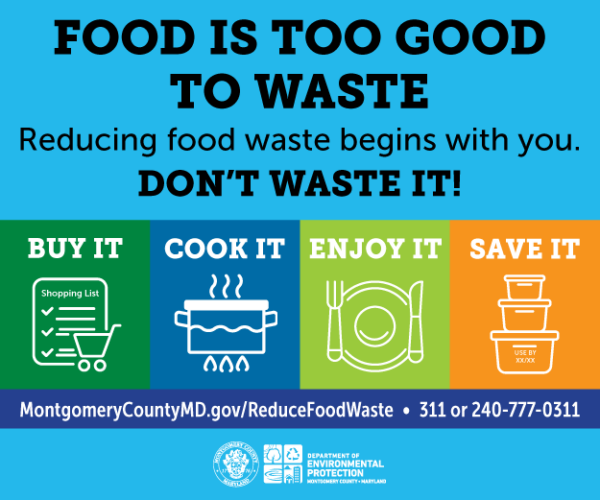This content is provided by the Montgomery County Department of Environmental Protection.

Wasted food is a major issue in the United States, as well as in Montgomery County, Maryland. The startling statistics point to Americans generating nearly 35 million tons of food waste annually and American families wasting approximately 30 percent of the food purchased, according to the USDA. Food waste not only affects budgets, but it also contributes to greenhouse gas emissions and wastes water and other natural resources. Reducing the amount of wasted food is a national goal and an important objective for Montgomery County, which aims to reduce waste and recycle more, aiming for Zero Waste. County residents, businesses and organizations can make a significant impact by changing their behavior about food waste.
The highest priority of Montgomery County’s solid waste management hierarchy is to prevent waste or at least reduce the amount of waste generated in the County. Reducing the amount of food disposed in the trash has many benefits. Not generating excess food scraps in the first place reduces the amount of waste that needs to be managed, potentially resulting in reduced costs in terms of collecting food scraps for composting or disposal. Food scraps generated in excess of generators’ needs but that are consumable (i.e., baked goods, fresh produce, canned or boxed foods, etc.) can be diverted from the solid waste stream and provided to residents who are in need of nutritious food that they may not be able to access. This channeling of food to others with unmet needs ensures that the highest and best use of this food occurs.
There are many reasons why food gets wasted including:
- Excess or unwanted food that is still consumable but not eaten;
- Food scraps that are generated during food preparation at home or in restaurants and other commercial food establishments but not used;
- Food that is thought to be “expired” or past its “best by,” “sell by” or “best if used by” dates;
- Foods that have blemishes or marks that are not attractive to customers; and
- Unused foods from the agricultural sector, such as unharvested crops.
If we each use better practices, we will reduce the amount of wasted food generated, which will reduce excess food scraps that must be collected, transported and processed, resulting in reduced disposal costs and less greenhouse gas emissions. There are many ways – that are simple to implement – to reduce food waste including planning and organizing meals ahead of going grocery shopping to save time, waste less food and eat healthier. Here are some manageable tips to help reduce wasted food:
- Avoid buying too much food. Buy only the food you need and eat what you buy to save money and reduce the amount of food that is wasted.
- Make a shopping list before going to the grocery store. Take an inventory of what you have and make a list of what you need before you shop. Buying foods that you already have or over buying is another source of waste.
- Plan your meals in advance. Consider making a weekly menu. This way you have a plan for what meals will be eaten at home. Shop for the items needed for those meals.
- Before you throw food away, think twice. Many vegetables and fruits that are slightly soft or wilted can be used in smoothies, soups, or baked dishes. Make sure to assess the condition of the food item and consider using it in another way before composting or throwing it away.
- Consider buying food from the bulk bins. Buying food from the bulk bins can save you money and reduce food waste and packaging as you can purchase only the more exact amount of food you need. When buying in bulk, remember to store food properly in airtight, labeled containers.
- Store food correctly. Make sure to store perishable items properly. Keep the refrigerator below 41 degrees and store food in sealed and labeled containers.
- Freeze extras. Freeze fruits, vegetables, meats, breads, prepared dishes and even some leftovers to extend the shelf life of the foods and reduce waste.
- Compost food scraps. Placing food scraps in a rodentproof compost bin reduces the amount of food disposed in the trash and turns food scraps (stems, peels, pieces of unused food and coffee grounds) into a beneficial soil amendment that can be used in gardens and potting soil.
Taking these steps will help reduce the amount of food waste in the County which will have a long-lasting, positive impact on our environment. For more information, visit: www.MontgomeryCountyMD.gov/ReduceFoodWaste.







